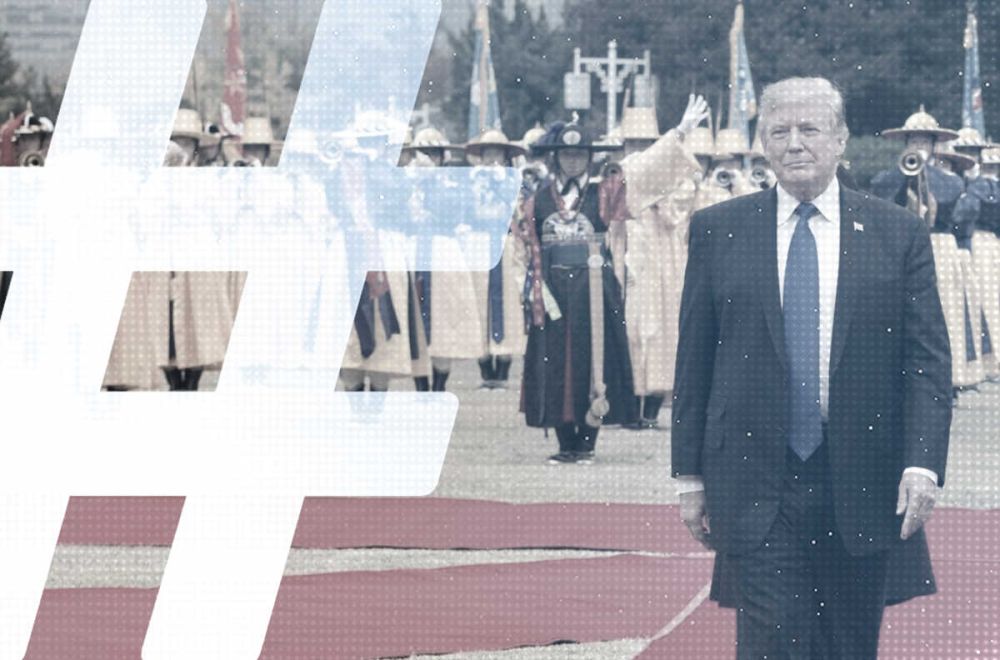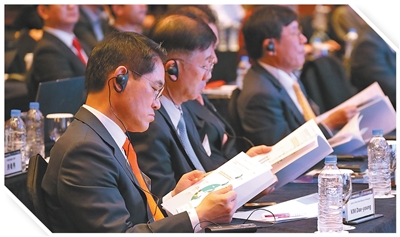
“Openness brings prosperity, closure brings decline.” This declaration opened a commentary in yesterday’s People’s Daily emphasizing China’s commitment to trade openness in the midst of President Trump’s visit to Asia this week, which is expected to culminate in a much-anticipated sideline meeting with Xi Jinping in Seoul, where a “framework” trade deal is on the agenda.
The commentary appeared under the pseudonymous byline Huanyu Ping (寰宇平), which translates something like “universal peace” — and in which the last character ping (平) is a homophone for “commentary,” or pinglun (评论), marking it as a specialized voice for key issues in global affairs. Like other pen names in the People’s Daily, this is not an individual author but rather a writing group (写作组) representing the consensus of the central leadership.
Addressing the upcoming APEC summit in South Korea, the commentary, “Gathering Asia-Pacific Strength to Continue Leading the Tide,” cited survey data from the People’s Daily showing that over 80 percent of respondents believe their countries benefit from APEC cooperation, and that 75 percent support deeper participation.
| Pen Name | Romanization | What It Represents |
|---|---|---|
| 钟才文 | Zhong Caiwen | Central Financial and Economic Affairs Commission commentary |
| 任仲平 | Ren Zhongping | People’s Daily Important Commentary (homophone: 人民日报重要评论) |
| 国纪平 | Guo Jiping | Important Commentary on International Affairs |
| 钟声 | Zhong Sheng | China’s Voice on international affairs (homophone: 中国之声) |
| 仲祖文 | Zhong Zuwen | Central Organization Department article |
| 钟轩理 | Zhong Xuanli | Central Propaganda Department Theory Bureau commentary |
| 钟华论 | Zhong Hualun | Xinhua News Agency leadership commentary |
| 钟纪轩 | Zhong Jixuan | Central Commission for Discipline Inspection propaganda |
| 钟政轩 | Zhong Zhengxuan | Central Political and Legal Affairs Commission commentary |
| 何振华 | He Zhenhua | “How to Revitalize China” commentaries (homophone: 如何振兴中华) |
| 王兴平 | Wang Xingping | Cyberspace Administration of China (CAC) commentary |
| 皇甫平 | Huangfu Ping | Liberation Daily (Shanghai) collective pen name, used for reform commentaries in 1991-92 |
| 郑青原 | Zheng Qingyuan | “Getting to the Source” – commentaries on political reform (homophone: 正本清源) |
| 宣言 | Xuan Yuan | Central Propaganda Department (homophone: 宣传 “propaganda”) |
| 本报评论员 | Commentator from this Newspaper | Important staff-written piece representing senior leadership views |
Interestingly, this same survey, conducted by the International News Department of the CCP’s flagship newspaper — under the direction of the Party’s Central Propaganda Department — was ceremoniously released earlier this month during the China-South Korea Media Cooperation Forum (中韩媒体合作论坛) in Seoul. That event, logged in our Lingua Sinica database, was a representative case in how China exploits ostensible media diplomacy to advance foreign policy objectives, often ahead of key diplomatic events.

In a written response to CMP following the event, Kim Jin-ho (金珍镐), a professor at South Korea’s Dankook University who was quoted in the People’s Daily, said his remarks at the Seoul forum were “carefully coordinated in advance with reporters from both the Maeil Business Newspaper and the People’s Daily.” Kim was quoted in the People’s Daily as remarking that media should “channel public opinion toward positive interaction” (引导舆论正向互动), language that echoes official CCP framing on media control, suggesting the primary role of media is to support bilateral relations.
Yesterday’s Huanyu Ping commentary emphasized that “open cooperation” has driven regional success over the past 30 years while warning that “protectionism has become one of the most severe challenges to regional development.” It quoted Chilean President Gabriel Boric as saying, in a clear but veiled reference to US President Donald Trump, that “launching trade wars leads nowhere.” These remarks were first reported in China’s state media back in May this year, when Boric made a visit to Beijing.
A second commentary yesterday appeared under the byline Zhong Sheng (钟声), or “Voice of China,” a homophone representing central leadership opinions on foreign affairs. This piece reported on US-China trade talks held October 25-26 in Kuala Lumpur, stating the two sides “reached basic consensus on arrangements to address respective concerns” on maritime logistics, shipbuilding tariffs, fentanyl enforcement, and agricultural trade. The commentary stressed the principle that “cooperation benefits both, while confrontation harms both,” a line that China has tread consistently, portraying itself as the voice of global responsibility in a time of turmoil.
The Zhong Sheng piece also referenced the recently concluded Fourth Plenum, which approved proposals for the 15th Five-Year Plan and called for “steadily expanding institutional opening, [and] maintaining the multilateral trade system.”
The deployment of both commentaries on the same day, using distinct pseudonymous voices standing in for the consensus view of the central leadership, exemplifies China’s messaging approach around major diplomatic events. The Seoul media engagement, survey release, and now these twin commentaries represent a coordinated narrative strategy — with the hope of preparing elite opinion ahead of the high-stakes diplomacy in Seoul.




















